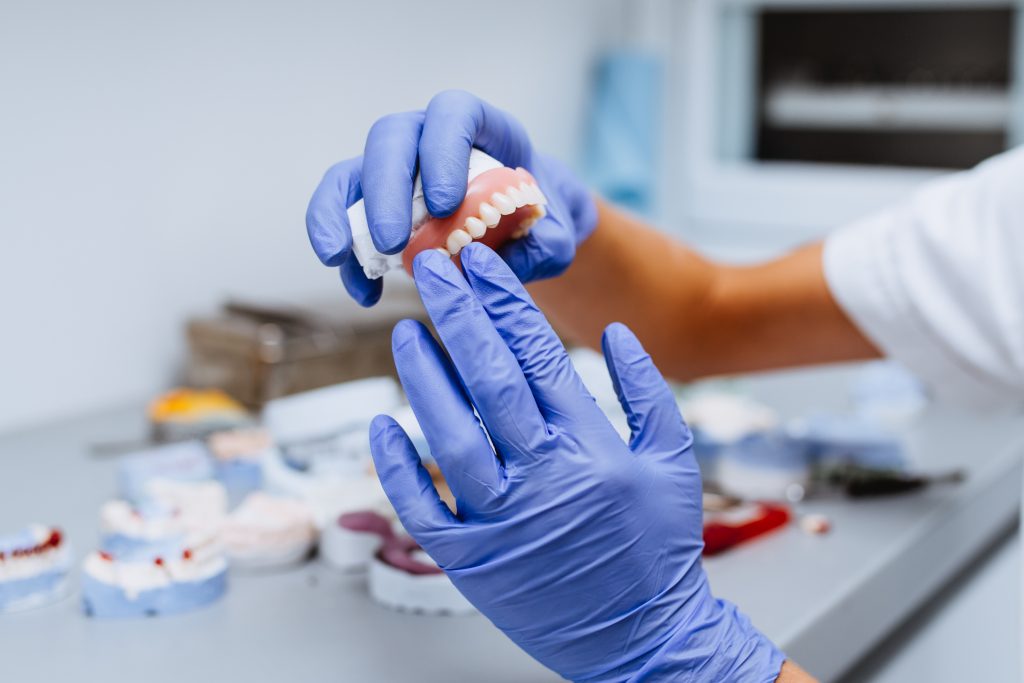For many people, dentures can be an excellent tooth replacement alternative. No matter how many teeth you have lost, they appear and feel natural and complete your smile. Dentures can still be challenging to get used to at first, despite all their advantages, especially when it comes to eating. You can read our top 5 recommendations for dining with a Calgary denturist. Take this advice, and you’ll soon be enjoying your favorite meals again!
Common Challenges When First Starting to Eat with Dentures
Typical obstacles that people encounter when first trying to eat with dentures include:
- Eating difficulties: Getting used to the unfamiliar feel and fit of dentures might make eating food more difficult. It could take some time to adjust and hone the coordination needed to efficiently chew various types of food.
- Gum and mouth soreness: As the mouth and gum tissues adapt to having dentures in place, they may become sore or tender. Initially, this soreness may make eating unpleasant.
- Excess saliva: Saliva production is stimulated by wearing dentures, which might result in an overabundance of saliva in the mouth. Having too much saliva can make it challenging to manage how your food moves when you’re eating.
- Changes in taste and temperature sensitivity: Wearing dentures can slightly change how food tastes and may have an impact on how hot or cold something feels.
- Shifting prosthetic: Dentures that are new may not fit snugly or securely, which can cause them to slip or shift when you’re eating. This can make it difficult to swallow and chew meals properly.
Tips for Adjusting to Eating with Dentures
-
Chew slowly on both sides.
Although it probably comes easy to you, be sure to chew your meal thoroughly. By doing this, you can become used to the sensation of chewing with dentures. It will further shield you from the possibility of choking. To keep you on track, count your chews; 10 should be sufficient, depending on what you are eating.
-
Don’t chew from your front teeth.
You run the danger of shifting your dentures if you try to bite down on food with your front teeth. Instead, chew with your side teeth and bring food to the back of your mouth with your tongue. Before swallowing, fully and slowly chew your food.
-
Go on a liquid diet.
It’s a good idea to follow a liquid diet for the first few days, which includes things like apple sauce, pudding, oatmeal, soup, and so on. Give your sensitive gums a few days to adjust to the dentures before moving on to solid food to avoid discomfort and possible gum damage.
-
Don’t consume too many hot liquids.
We all enjoy our coffee and hot cocoa, but after receiving your dentures, use them with extreme caution. Because of their insulating properties, you might not notice that anything is excessively hot until it’s too late. Take a modest sip of a hot beverage to ensure its safety.
-
Take care while enjoying sticky foods.
Sticky foods can easily get stuck between your dentures and your gums, increasing your risk of discomfort and infection. These foods include chocolates, peanut butter, gum, and some berries. Enjoy them, but be sure to thoroughly clean your mouth and dentures afterwards.
Come into North East Denture Clinic
You’ll probably be eating normally in a few weeks if you follow these suggestions and have a little patience. Dentures require some getting used to, but they are undoubtedly better than living with multiple tooth loss, don’t you think? Before you know it, you’ll be having dinner with your family and friends, and your dentures will be the furthest thing from your mind.
You can reach out to our denture clinic near you if you have any more questions. Talk to you soon!

